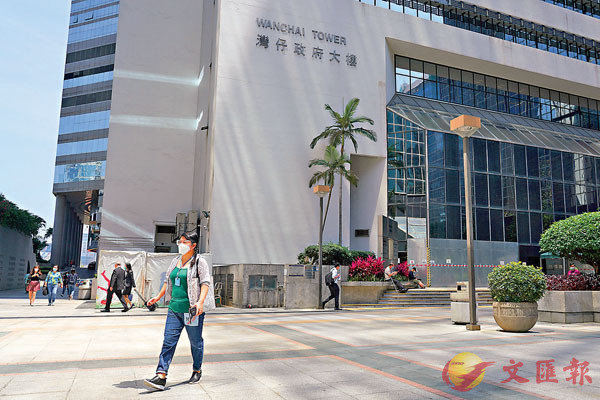 ■香港特區決定凍結高層、中層及低層薪金級別和首長級公務員的薪酬。 資料圖片
■香港特區決定凍結高層、中層及低層薪金級別和首長級公務員的薪酬。 資料圖片【原文】統計處公布2月至4月失業率為5.2%,升至逾十年新高。本港經濟持續受新冠疫情影響,情況可能進一步轉壞,政府大手筆推出的保就業計劃應從速落實,僱主亦要盡全力照顧僱員。公務員隊伍作為穩定香港的重要力量,在此艱難時刻,應該選擇凍薪,以示與市民共度時艱,騰出更多公共資源,以幫助更有需要的基層市民。
本港今年1月至3月的失業率達4.2%,2月至4月更急升至5.2%,這個單次升幅是1981年有記錄以來最大,失去飯碗的市民增加超過4萬人。數字足見疫情對勞工市場帶來巨大打擊,打工仔的飯碗持續面對巨大壓力。
其中,與消費及旅遊相關的行業,失業率已急升至9%的15年最高,如果跨境和國際人員流動不能在短期內逐步恢復正常,可以預見,越來越多行業的失業率將達到雙位數。
政府早前推出三輪抗疫紓困措施,希望「撐企業、保就業、紓民困」,包括推出810億元「保就業」計劃,向僱主提供相當於僱員薪金一半的財政補助,協助企業保留員工職位,為香港經濟復甦保留實力。由於保就業計劃的補貼金額全數給僱主,僱主當然要發揚同舟共濟的精神,自覺遵守不裁員承諾,將所有政府的補貼用於員工身上,盡力履行社會責任,保障僱員的福祉,減輕疫情對就業市場的打擊。
另外,薪酬趨勢調查委員會昨日提交今年公務員加薪淨指標,低中高級公務員分別是1.15%、1.98%和1.68%。即便如此,委員會亦強調調查反映的是去年4月2日至今年4月1日的市場情況,數據滯後,未能充分反映疫情影響。
公務員作為服務市民的公僕,在考慮加薪幅度時,必須考慮社會狀況和市民觀感,在公務員士氣和經濟社會大環境之間作出平衡。往年公務員的加薪幅度均高於通脹,如今本港經濟陷入深度低迷,公務員薪酬調整,理應反映經濟下行的現況。
較早前,特首林鄭月娥聯同司局長、行政會議非官守成員已經宣布自願減薪一成,以示與民共度時艱的決心。在今時今日的經濟環境下,公務員有穩定的工作,無被裁員減薪的後顧之憂,如果選擇凍薪,可以顯示體恤民情民意、願與市民同甘共苦。
由於動用龐大資源推出多輪紓困措施,財政司司長陳茂波早前表示,今個年度的財政赤字達到兩三千億「走唔甩」。疫情後香港經濟百廢待興,政府有必要推出更多措施創造就業,這需要動用更多財政資源。公務員凍薪,騰出更多資源,幫助受衝擊更大的打工仔渡過難關,有利促進社會和諧。 (摘錄自香港《文匯報》社評20-5-2020)
Civil servants should weather the storm with the public if the Employment Support Scheme is to be implemented quickly
【譯文】Unemployment rate in Hong Kong has hit a 10 year high as the figure for the February to April period climbed to 5.2 per cent, according to the Census and Statistics Department. As the Covid-19 pandemic continues to weigh on the local economy, employers should do their best to take care of employees, and the government's Employment Support Scheme should also be implemented as quickly as possible before the situation deteriorates further. Being one of the strongest stabilizing forces in Hong Kong, civil servants should ride out the storm together with the public by supporting a freeze in their salaries, so that more resources could be transferred and used on helping the needy.
The unemployment rate in Hong Kong rose to 4.2 per cent in January to March this year, and later soared to 5.2 per cent in February to April. The surge is highest in record since 1981, with over 40,000 people losing their jobs during this period. The figures show that the Covid-19 pandemic has dealt a huge blow to the labour market, and that wage earners continue to face tremendous pressure from the economic downturn. Among all the sectors that are affected, the consumer and tourism related industries are hit hardest, as unemployment rates in these sectors soared to a 15-year high of 9 per cent. If cross-boundary and international people flow cannot return to normal in the short term, it is foreseeable that the unemployment rates in more and more sectors will reach double-digits.
Previously the government announced that there will be three rounds of relief measures in order to support enterprises, safeguard jobs, and relieve people's burden. One of the measures is the HK$81 billion strong Employment Support Scheme, which aims to help enterprises retain employees who may otherwise be made redundant, hence maintaining the strength for Hong Kong. Under the scheme, employers are going to receive financial subsidies that amount to 50 per cent of their expenditures on employees' basic salary. As the financial aid provided will be disbursed to employers, they should show solidarity with employees and comply with their undertakings by not making any redundancies and spending all the subsidies on paying wages to employees. In doing so, employers are also fulfilling their social responsibilities, safeguarding the interests of their employees, and reducing the impact of the pandemic on the local labour market.
Meanwhile, the Pay Trend Survey Committee submitted the gross pay trend indicators to the government yesterday. The recommended pay rises for frontline, middle-ranking and senior staffers are 1.15, 1.98 and 1.68 per cent respectively. However, the committee has also stressed that the survey result only covers the 12-month period from 2 April 2019 to 1 April 2020, and that the data may not reflect the full extent of the impact brought by the pandemic. As servants of the public, they must take into account the various conditions of the society as well as public perceptions when determining their pay rise. A balance should be struck between maintaining the morale of civil servants and socio-economic considerations. In the past few years, civil servants had been given pay rises at rates that were higher than inflation. Now that our economy is heading into a steep downturn, it is only reasonable to scale the pay rise of civil servants in a way that reflects the current state of Hong Kong's economy.
Earlier, Chief Executive Carrie Lam Cheng Yuet-ngor announced that she would take a voluntary 10 per cent pay cut along with all principal government officials and non-official members of the Executive Council, in order to show their determination to share the ups and downs with the people. Civil servants enjoy stronger job security even in such difficult times. Accepting a pay freeze could reinforce the message that the government is willing to ride out the storm with citizens.
According to Financial Secretary Paul Chan Mo-po's earlier remarks, Hong Kong's budget deficit may hit HK$200-300 billion by the end of the financial year as the relief measures draw up resources. When the pandemic is over, the government will have to roll out more measures to create jobs, which would in turn require even more financial resources. A pay freeze for civil servants will free up more of the much-needed resources to help those wage earners in need, and therefore is beneficial to the social harmony as a whole.■Jeffrey Tse
Exercise
1. 經濟衰退
2. 封城
3. 隔離
4. 自僱人士
5. 就業不足
Answer
1. recession
2. lockdown
3. quarantine
4. self-employed person
5. underemployment

